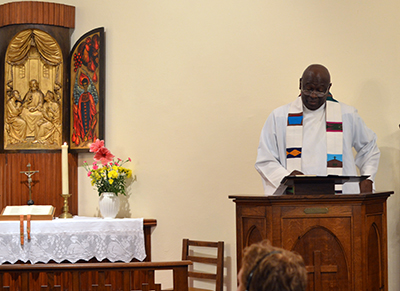
LCSA Bishop Modise Maragelo preaches during matins.
BELGIUM – The final day of the International Lutheran Council’s (ILC) 2018 World Conference opened with a service of matins in Holy Trinity Lutheran Church in Antwerp. Bishop Modise Maragelo of the Lutheran Church in Southern Africa preached for the service, looking forward to the commemoration of St. Michael and all Angels on September 30. Rev. Timothy Quill served as liturgist.
Following matins, Rev. Milton Huatuco, outgoing President of the Evangelical Lutheran Church – Peru, presented a study on Latin American Lutheranism and ecumenism. His report highlighted how local context affect the ecumenical efforts. In Latin America, for example, he noted that Lutherans make up only 0.15 percent of the Latin American population, making Lutherans a small player on the ecumenical scene. Likewise, historic persecution of Protestants make some groups skeptical of rapprochement with Roman Catholics, the major Christian church in Latin America. Intra-Lutheran discussions, however, have been a fruitful ecumenical project, especially in Brazil and Argentina.
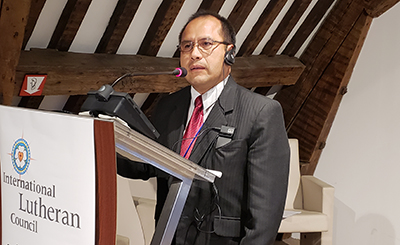
Outgoing President Milton Huatuco of the Evangelical Lutheran Church – Peru leads a study on Lutheran ecumenism in Latin America.
The morning session saw greetings to the ILC from Bishop Mark Lieschke, on behalf of Bishop John Henderson and the Lutheran Church of Australia (LCA). The LCA is preparing for its triennial convention, which is scheduled for the coming week. ILC Chairman Hans-Jörg Voigt thanked Bishop Lieschke for his remarks, and offered his prayers that God would bless the LCA and send His Holy Spirit to guide them during their forthcoming convention.
Bishop Torkild Masvie of the Lutheran Church of Norway (LKN) reported on Concordia Israel, a recent project of the Evangelical Lutheran Church Ingria in Russia (ELCIR) undertaken in partnership with the LKN. Concordia Israel provides Lutheran education for the evangelical Lutheran church in Israel, including support for pilgrim trips and study tours to Israel; Lutheran education to congregations and congregation members in Israel; and online theological university training.
Later in the day, the convention voted to receive the invitation from the ELCIR and LKN to host the 2021 World Conference of the ILC in Israel, directing the Executive Committee to explore the feasibility of the proposal. In the event the location proves too difficult to arrange, the Executive Committee was authorized to select another location for the 2021 World Conference.
Ecumenism in the Confessions, Ecumenism in Practice
A highlight of the final day’s session was a report on the International Lutheran Council’s informal international dialogue with the Pontifical Council for Promoting Christian Unity (PCPCU). Rev. Dr. Werner Klän, who serves as the Lutheran co-chairman of the dialogue, addressed the convention on the work accomplished over the past several years. He noted that the initial idea for dialogue came from the Roman Catholic side, leading eventually to discussions in Rome in 2013, a preperatory meeting in 2014, and finally the official beginning of the dialogue group in 2015.
The most recent round in the ILC-PCPCU’s informal international dialogue took place September 17-21 in Bleckmar, Germany. A report on those discussions will be published online by the ILC soon. The concluding meeting of the current round of discussions is scheduled for 2019, at which time the dialogue group will present a final report summarizing their findings and making recommendations to the ILC and the PCPCU about future possibilities for continued dialogue.
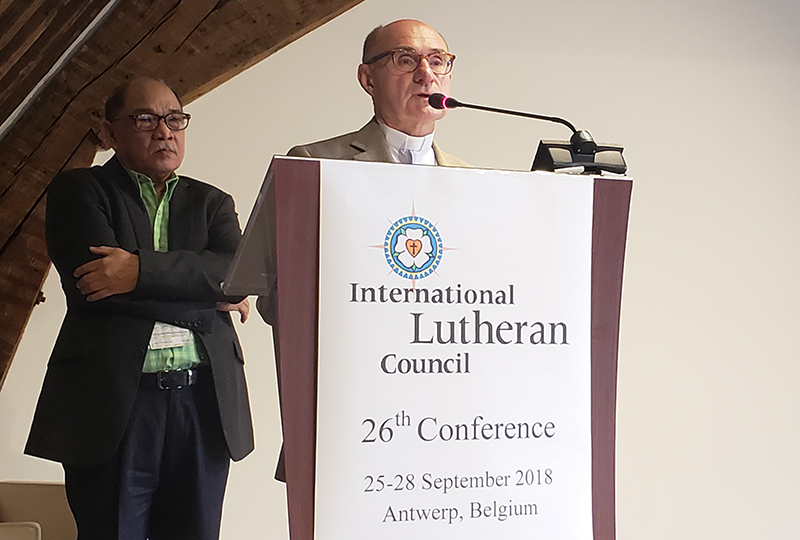
Professors Roa and Klän answer questions on their respective presentations to the ILC World Conference.
Following Dr. Klän’s report, Rev. Wilando Roa presented the convention’s final lecture on its theme of ecumenism and ecclesiology. In his talk, Rev. Roa explored the Lutheran Confessions as the basis for faithful dialogue with other Christians. The conclusion of his lecture provided a roadmap for future ecumenical opportunities, noting that “those closest to us in the household of faith… deserve our first attention.” To that end, he encouraged member churches of the ILC to initially focus their ecumenical efforts inwards—working with those estranged in our own denominations—before moving outward: first by seeking greater dialogue with partner churches; then dialoguing with church bodies no longer in fellowship with us; then looking to other Lutheran churches; and finally looking out to groups outside the Lutheran tradition.
Later in the day, the convention distilled some of the week’s discussions of ecumenism and adopted a brief statement on “Confessional Identity and Ecumenical Responsibility.” Read the full statement here.
Putting that ecumenical concern into practice, the convention also adopted a resolution on ILC relations with the Lutheran World Federation (LWF), noting that “the ILC Executive Committee remains open to conversation with the LWF Council to help clarify points of confusion and to facilitate an ongoing exchange of information.” The full resolution is available to download here. The 2018 resolution reaffirms the position on dual membership in the ILC and LWF first taken at the 2007 World Conference in Accra, Ghana (see the 2007 resolution here).
Closing Service and the Installation of the Executive Committee
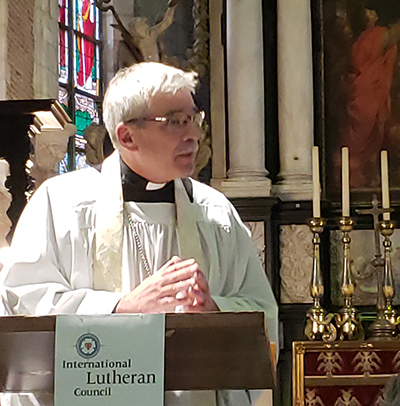
LCC President Timothy Teuscher preaches the final sermon of the 2018 World Conference.
The convention concluded with a final service of evening prayer, with President Gijsbertus van Hattem of the Evangelical Lutheran Church in Belgium serving as lector and Rev. Timothy Quill as liturgist. Serving as cantor and organist this day, as every day of the conference, was Matthew Machemer.
As with matins earlier, the service of evening prayer f focused on biblical texts surrounding the ministry of angels, with President Timothy Teuscher of Lutheran Church–Canada preaching. The passage under discussion focused on the angels’ conflict with the devil. Because that ancient serpent is the father of lies, President Teuscher noted, one of the most important weapons of the angels is the Sword of Truth, the Word of God—and this is a weapon that we too are called to wield against the devil’s lies. It is natural that angels should adopt such a weapon, President Teuscher explained, since the very meaning of their name—“angel”—is “messenger.” And the message they proclaim is Christ, God incarnate and Saviour of the world.
The service concluded with the rite of installation for the newly elected and appointed members of the International Lutheran Council’s Executive Committee.
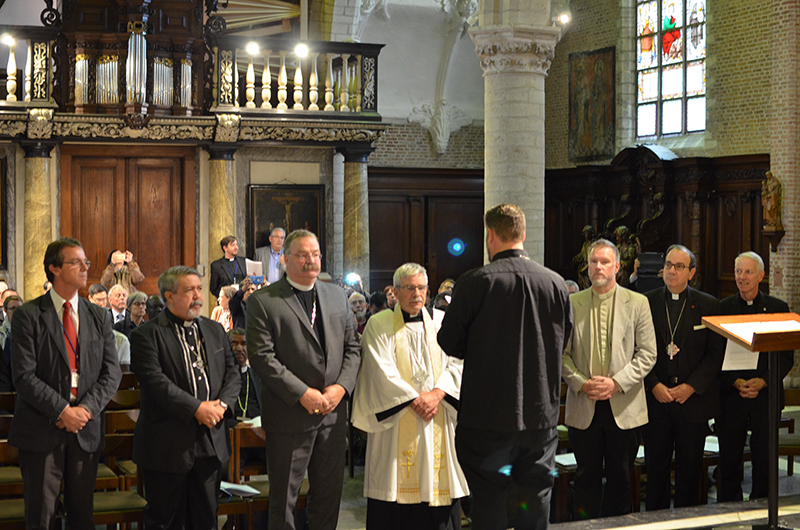
Rev. Dr. Albert Collver, ILC Executive Secretary, installs the officers of the new triennium’s Executive Committee. (Photo: S. van Hattem).
———————
